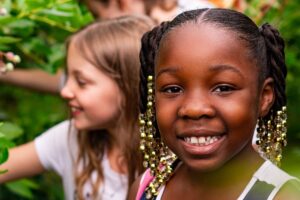
July 29, 2020
A Message from Traci Rossi, Our Executive Director
Dear donor,
It is with an incredible amount of appreciation, excitement and humility that I am writing to you today as the new Executive Director at Friends of the Children–Portland. I want to begin by saying thank you for believing that inside every youth is a spark; that every youth has a voice that deserves to be heard: and, most importantly, for showing up in the ways you do to make sure every child has the opportunity to build a future for themselves. The 1:1 Friends model generates real change. But it does not work because of you, me or anyone youth individually, it works because of us.
As the new Executive Director, I am coming into the next chapter of the organization’s journey – as COVID-19 rears its ominous head and the killing of Ahmaud Arbery, Breonna Taylor and George Floyd reminds us of the day-to-day realities facing the nearly 400 youth of color we serve. I am emboldened and step into this moment in time with great hope, optimism and a clear vision.
Many of our youth and their families rely on public support services in their everyday lives and are experiencing urgent levels of need due to loss of employment-related to COVID-19. They are expressing feelings of fear and overwhelm as they try to navigate overburdened systems, in addition to language barriers, pre-existing health conditions among household members, and the risks associated with being stopped by police as a person of color during the Stay at Home ordinance. Our families who are undocumented are experiencing these in addition to being ineligible to receive the stimulus checks intended to alleviate the financial impact of COVID-19. With most of our program youth living in lower-income districts, where schools, students, and teachers have less access to digital learning resources, they are at a higher risk of falling behind academically than their more affluent peers.
In response to these educational inequities, we implemented Remote Service Plans for each youth to provide stability during COVID-19. As a result of our long-term, relationship-based model, Friends draw from a strong partnership with each youth and family in anticipating communication challenges and streamlining problem-solving.
After Friends identified the youth at the highest risk of food insecurity, we developed a protocol for delivering packages prepared by the Northeast Emergency Food Program to youth and families while respecting social distancing measures. To date, we have delivered roughly 300 food packages to almost 140 families.
The reality is that the youth we serve, along with their caregivers, have had to live with the uncertainty of “pandemic-like” conditions for as long as they can remember: economic insecurity, health disparities, food insecurity, fear, maltreatment, and disenfranchisement for generations due to systemic barriers and inequities. One of our Friends, Paul, has mentored the same 11 youth for the past ten years and has seen them grow from little tykes to incoming 11th graders. He says the greatest resources he can offer to his boys right now is empathy, understanding and non-judgment: “I’m watching them navigate society and the world around them, and they are experiencing a lot of the same struggles I had, not feeling validated culturally, especially in academia.”
To truly achieve systems change, I see our 26-year history of growth and success as an opportunity to collaborate with key stakeholders, organizational partners and community leaders to amplify what we have learned, to remove barriers to success and to demand structural and systemic changes for all of us Oregonians to thrive.
Whether you have been a longtime supporter or are new to our organization, it has never been more important to be brave with your voice, actions, and investments. I am calling on the Friends community – I am reaching out to you – to bolster the support we show our youth.
In service to one of our core values – demand equity – we will move forward with diversity, equity, and inclusion as our guiding force. To serve a diverse community well, we value differences and see our differences as strengths. We will continue our equity journey not only in service to the diverse populations we serve, but because it is the way to see the complexity and difference within ourselves. Those complexities are what ultimately unites us, and they are inherent to the success of Friends, both today and as we move forward.
Sincerely,
Traci Rossi
Executive Director